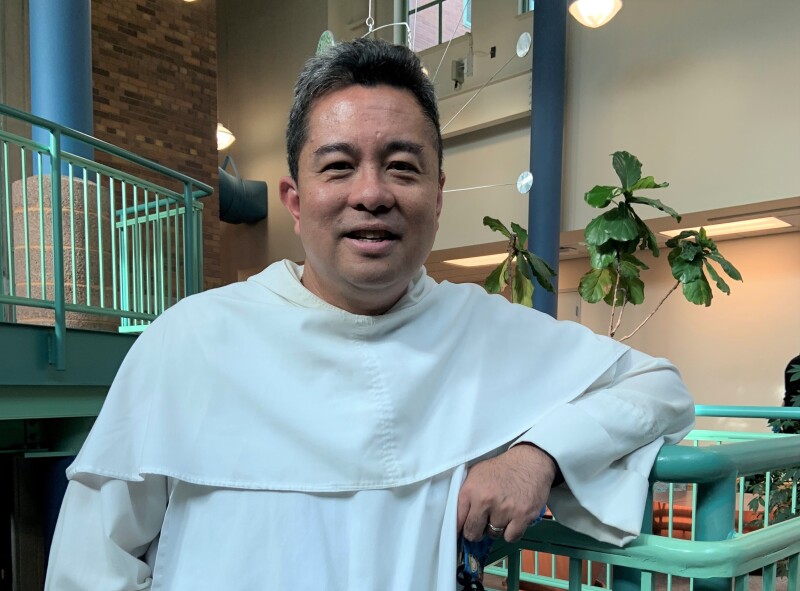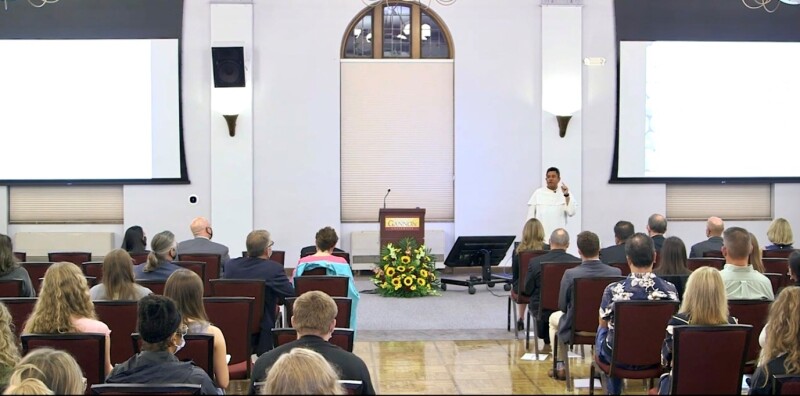
WHAT IS THE COMMON GOOD IN FACE OF COVID VACCINES?
Mary Solberg
09/21/2021
ERIE, PA. — For Dominican Father Nicanor Austriaco, lacrosse and Catholic moral tradition — while seemingly disparate — both point to the importance of discerning the common good during the COVID-19 pandemic.

Erie, Sept. 15. Photo/Mary Solberg
Playing on a team requires an athlete to be the best he or she can be physically, while also working in concert with the entire team for the win.
Moral theology puts love of God and neighbor — not our individual selves — at the center of the universe.
In a recent interview with Erie’s Faith magazine, Father Austriaco said both examples are vital to examine as the globe wrestles with the best way to control the spread of COVID-19 and its variants.
“God made us free so we could love. Regarding the use of the COVID vaccines, the question is, ‘Will vaccination help me to love my neighbor more or less?’” Father Austriaco said. “Right away, you see this question has to do with me, but it challenges us to look at our neighbor. Americans think of freedom as the goal; it’s not. Love is the goal. Freedom is the means to get to that love.”
Father Austriaco shared these thoughts before his presentation to more than 300 people — virtually and in person — for the inaugural Orlando Biomedical Ethics and Catholic Social Teaching Lecture Series at Erie’s Gannon University Sept. 15.
The title of his talk, “COVID-19 Vaccines: Individual Freedom and the Common Good,” points to the growing difficulty America has had in convincing most of its citizens to be vaccinated against the deadly disease.
For Father Austriaco, a professor of biology and theology at Rhode Island’s Providence College, the problem is the politicization of vaccines in the U.S., which runs contrary to Catholic social teaching and Christian moral theology.

University's Yehl Ballroom, Sept. 15. Livestream grab
“Unfortunately, vaccination has become a highly politicized issue. By contrast, in the Philippines, vaccination is understood as being a civic responsibility. Many people are waiting to get vaccinated because there aren’t enough vaccines. They are looking at this as an opportunity do their part to fight the pandemic. Unfortunately, what’s happening in America is it’s a means by which we fight each other.”
He called the debate between the pro- and anti-vaccine sides “a privilege of the rich.” Developing nations throughout the world are struggling to get vaccines and have significantly fewer intensive care beds for COVID patients. Culturally, the care of susceptible senior citizens falls to younger family members, not nursing homes.
“In the Philippines, there is no debate because there is no choice,” Father Austriaco said.
Father Austriaco and two others, a mathematician and a political scientist, are in charge of pandemic management for the Philippines, his native country. They calculate the most efficient way to distribute vaccines in the Philippines and they monitor data as it comes in every day.
He calls it a “humbling experience,” one which has given him a larger view of the Filipino experience and that of the world. Even the poor woman living in the slums of Manila who has no access to a vaccine can be better protected from COVID if more people worldwide were vaccinated.
“The vaccine is not given only for you, it’s given for all of us,” Father Austriaco said.
In his speech at Gannon’s Yehl Ballroom, and viewed virtually at Gannon’s Florida campus, Father Austriaco further drove home his point, saying, “The common good extends beyond loving only the people we love.”
On the subject of people who believe they are committing a mortal sin by taking a vaccine, Father Austriaco said he supports conscientious objection if someone has discerned through thought, prayer and good counsel that they will be condemned to eternal punishment by taking a vaccine.
“Properly speaking, Catholics do not have any religious exemption from receiving vaccines because [the church has] supported vaccines forever,” Father Austriaco said. “If people don’t think they can claim conscientious objection, if they just don’t want to [get a vaccine], then denying a vaccine is a political act. Political acts do not follow under conscientious objection because the common good is so great.”
Editor's note: Here is a link to the livestream presentation of Father Austriaco's talk.
###
-
